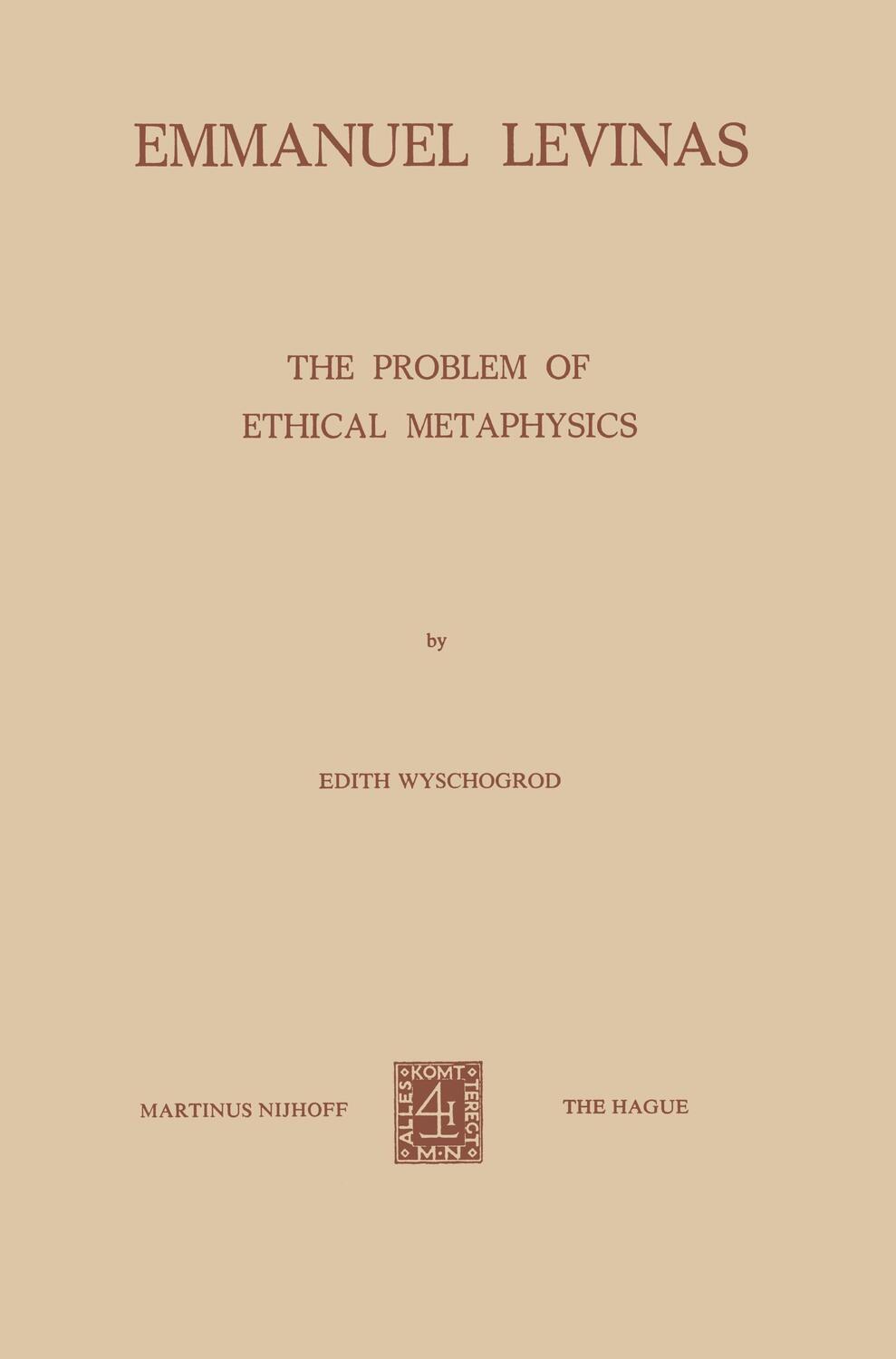Dekorationsartikel gehören nicht zum Leistungsumfang.
Sprache:
Englisch
320,99 €*
Versandkostenfrei per Post / DHL
Aktuell nicht verfügbar
Kategorien:
Beschreibung
The present attempt to introduce the general philosophical reader to the Phenomenological Movement by way of its history has itself a history which is pertinent to its objective. It may suitably be opened by the following excerpts from a review which Herbert W. Schneider of Columbia University, the Head of the Division for International Cultural Cooperation, Department of Cultural Activities of Unesco from 1953 to 56, wrote in 1950 from France: The influence of Husserl has revolutionized continental philosophies, not because his philosophy has become dominant, but because any philosophy now seeks to accommodate itself to, and express itself in, phenomenological method. It is the sine qua non of critical respectability. In America, on the contrary, phenomenology is in its infancy. The average American student of philosophy, when he picks up a recent volume of philosophy published on the continent of Europe, must first learn the "tricks" of the phenomenological trade and then translate as best he can the real impon of what is said into the kind of imalysis with which he is familiar . . . . No doubt, American education will graduaUy take account of the spread of phenomenological method and terminology, but until it does, American readers of European philosophy have a severe handicap; and this applies not only to existentialism but to almost all current philosophical literature. ' These sentences clearly implied a challenge, if not a mandate, to all those who by background and interpretive ability were in a position to meet it.
The present attempt to introduce the general philosophical reader to the Phenomenological Movement by way of its history has itself a history which is pertinent to its objective. It may suitably be opened by the following excerpts from a review which Herbert W. Schneider of Columbia University, the Head of the Division for International Cultural Cooperation, Department of Cultural Activities of Unesco from 1953 to 56, wrote in 1950 from France: The influence of Husserl has revolutionized continental philosophies, not because his philosophy has become dominant, but because any philosophy now seeks to accommodate itself to, and express itself in, phenomenological method. It is the sine qua non of critical respectability. In America, on the contrary, phenomenology is in its infancy. The average American student of philosophy, when he picks up a recent volume of philosophy published on the continent of Europe, must first learn the "tricks" of the phenomenological trade and then translate as best he can the real impon of what is said into the kind of imalysis with which he is familiar . . . . No doubt, American education will graduaUy take account of the spread of phenomenological method and terminology, but until it does, American readers of European philosophy have a severe handicap; and this applies not only to existentialism but to almost all current philosophical literature. ' These sentences clearly implied a challenge, if not a mandate, to all those who by background and interpretive ability were in a position to meet it.
Inhaltsverzeichnis
1. The Phenomenological Movement Defined.- 2. Unrelated Phenomenologies.- 3. Preview.- One / The Preparatory Phase.- I. Franz Brentano (1838-1917): Forerunner of the Phenomenological Movement.- II. Carl Stumpf (1848-1936): Founder of Experimental Phenomenology.- Two / The German Phase of the Movement.- III. The Pure Phenomenology of Edmund Husserl (1859-1938).- IV. The Original Phenomenological Movement.- V. The Phenomenology of Essences: Max Scheler (1874-1928).- VI. Phenomenology in the Critical Ontology of Nicolai Hartmann (1882-1950).- VII. Martin Heidegger (1889-1976) as a Phenomenologist.- Three / The French Phase of the Movement.- Introductory.- VIII. The Beginnings of French Phenomenology.- IX. Gabriel Marcel (1889-1974) as a Phenomenologist.- X. The Phenomenology of Jean-Paul Sartre (1905-1980).- XI. The Phenomenological Philosophy of Maurice Merleau-Ponty (1908-1961).- XII. Paul Ricoeur and Some Associates.- XIII. Emmanuel Levinas (Born 1906): Phenomenological Philosophy (by Stephan Strasser).- Four / The Geography of the Phenomenological Movement.- Five / The Essentials of the Phenomenological Method.- Appendices.- Chart I: Chronology of the Phenomenological Movement in Germany.- Chart II: Chronology of the Phenomenological Movement in France.- Chart III: Chronology of the Phenomenological Movement in the Anglo-American World.- Index of Subjects, Combined with a Selective Glossary of Phenomenological Terms.- Index of Names.
Details
| Erscheinungsjahr: | 1981 |
|---|---|
| Genre: | Philosophie |
| Jahrhundert: | 20. & 21. Jahrhundert |
| Rubrik: | Geisteswissenschaften |
| Medium: | Taschenbuch |
| Seiten: | 856 |
| Reihe: | Phaenomenologica |
| Inhalt: |
xlix
768 S. |
| ISBN-13: | 9789024725359 |
| ISBN-10: | 9024725356 |
| Sprache: | Englisch |
| Ausstattung / Beilage: | Paperback |
| Einband: | Kartoniert / Broschiert |
| Autor: | Spiegelberg, E. |
| Redaktion: | Spiegelberg, E. |
| Herausgeber: | E Spiegelberg |
| Auflage: | 3rd ed. 1994 |
| Hersteller: |
Springer Netherland
Springer Netherlands Phaenomenologica |
| Maße: | 235 x 155 x 46 mm |
| Von/Mit: | E. Spiegelberg |
| Erscheinungsdatum: | 31.12.1981 |
| Gewicht: | 1,27 kg |
Inhaltsverzeichnis
1. The Phenomenological Movement Defined.- 2. Unrelated Phenomenologies.- 3. Preview.- One / The Preparatory Phase.- I. Franz Brentano (1838-1917): Forerunner of the Phenomenological Movement.- II. Carl Stumpf (1848-1936): Founder of Experimental Phenomenology.- Two / The German Phase of the Movement.- III. The Pure Phenomenology of Edmund Husserl (1859-1938).- IV. The Original Phenomenological Movement.- V. The Phenomenology of Essences: Max Scheler (1874-1928).- VI. Phenomenology in the Critical Ontology of Nicolai Hartmann (1882-1950).- VII. Martin Heidegger (1889-1976) as a Phenomenologist.- Three / The French Phase of the Movement.- Introductory.- VIII. The Beginnings of French Phenomenology.- IX. Gabriel Marcel (1889-1974) as a Phenomenologist.- X. The Phenomenology of Jean-Paul Sartre (1905-1980).- XI. The Phenomenological Philosophy of Maurice Merleau-Ponty (1908-1961).- XII. Paul Ricoeur and Some Associates.- XIII. Emmanuel Levinas (Born 1906): Phenomenological Philosophy (by Stephan Strasser).- Four / The Geography of the Phenomenological Movement.- Five / The Essentials of the Phenomenological Method.- Appendices.- Chart I: Chronology of the Phenomenological Movement in Germany.- Chart II: Chronology of the Phenomenological Movement in France.- Chart III: Chronology of the Phenomenological Movement in the Anglo-American World.- Index of Subjects, Combined with a Selective Glossary of Phenomenological Terms.- Index of Names.
Details
| Erscheinungsjahr: | 1981 |
|---|---|
| Genre: | Philosophie |
| Jahrhundert: | 20. & 21. Jahrhundert |
| Rubrik: | Geisteswissenschaften |
| Medium: | Taschenbuch |
| Seiten: | 856 |
| Reihe: | Phaenomenologica |
| Inhalt: |
xlix
768 S. |
| ISBN-13: | 9789024725359 |
| ISBN-10: | 9024725356 |
| Sprache: | Englisch |
| Ausstattung / Beilage: | Paperback |
| Einband: | Kartoniert / Broschiert |
| Autor: | Spiegelberg, E. |
| Redaktion: | Spiegelberg, E. |
| Herausgeber: | E Spiegelberg |
| Auflage: | 3rd ed. 1994 |
| Hersteller: |
Springer Netherland
Springer Netherlands Phaenomenologica |
| Maße: | 235 x 155 x 46 mm |
| Von/Mit: | E. Spiegelberg |
| Erscheinungsdatum: | 31.12.1981 |
| Gewicht: | 1,27 kg |
Warnhinweis












